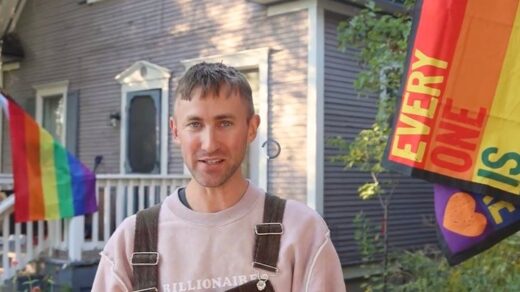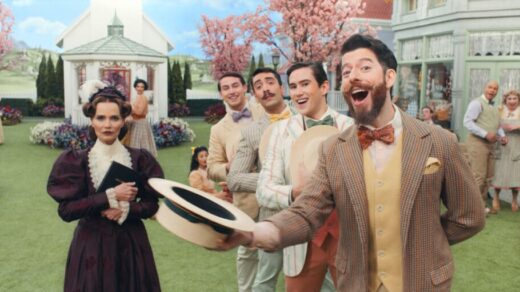Dianne Feinstein: An LGBTQ+ Rights Champion
Author: Trudy Ring

U.S. Sen. Dianne Feinstein of California, who died Friday at age 90, is being remembered as a champion of LGBTQ+ equality — with a few exceptions.
Feinstein began her political career as a member of the San Francisco Board of Supervisors, the combined city-county government body, and she eventually became its president. She served nine years, beginning in 1969. Early in 1978, the board passed the most far-reaching gay rights ordinance in the nation.
She became acting mayor in November 1978 when Mayor George Moscone was assassinated along with Supervisor Harvey Milk. She was the one who found Milk’s body and the one who announced their deaths to the public. She has referred to the date of the deaths as “the darkest day of my life.”
Thirty years later, she expressed regret that she hadn’t been able to do something to stop shooter Dan White. White had resigned from the Board of Supervisors but changed his mind and wanted his position back, but Moscone had appointed someone else. She wanted to explain the decision to White but never got the chance. The day of the killings was her first day back after being gone for three weeks on vacation and recovering from an illness contracted during the trip.
“I still believe that if I could have been there for that three weeks, I could have stopped it,” she told the San Francisco Chronicle in 2008. “Now, who knows? Who knows?”
Feinstein was elected to a full four-year term as mayor in 1979 and was reelected in a landslide in 1983. Although she had been one of the first San Francisco politicians to court the gay and lesbian vote, she took some actions as mayor that upset the community.
In 1982, she vetoed an ordinance that would have allowed unmarried couples to register their domestic partnerships and extended spousal benefits to the same-sex partners of city employees. She said she didn’t oppose the concept but found the ordinance full of “ambiguity, vagueness, and unclarity.” San Francisco didn’t adopt such an ordinance until 1989, when Feinstein was no longer mayor.
In 1984, she ordered that the city’s bathhouses be closed as a means to combat the spread of HIV. This came although public health officials and activists hadn’t reached agreement that such a move was necessary.
Her other actions against the epidemic, however, have received widespread praise. In the mid-1980s, San Francisco’s spending to combat HIV and AIDS outstripped that of the federal government. “I don’t recall any moment in the early epidemic when I was told, ‘No, we can’t do that because we don’t have the resources,'” San Francisco physician Paul Volberding told NPR.
She was elected to the U.S. Senate in 1992. Early in her tenure, she opposed “don’t ask, don’t tell,” a compromise reached between President Bill Clinton and Congress when Clinton wanted to lift the ban on lesbian, gay, and bisexual people in the military. DADT was supposed to make things better for LGB troops, protecting them from being investigated and discharged, but it didn’t. Feinstein had supported lifting the ban altogether.
In 1996, she was one of only 14 senators to vote against the Defense of Marriage Act, which prevented the federal government from recognizing same-sex marriages and allowed states to deny recognition to those performed in other states.
She wasn’t always a supporter of marriage equality, though, saying she favored civil unions instead. In 2004, she criticized the decision by Gavin Newsom, then San Francisco mayor, to perform and recognize same-sex marriages in the city. She said it was partly to blame for Democrat John Kerry’s loss to George W. Bush in the presidential election that year. “I think that whole issue has been too much, too fast, too soon,” she said at the time. “And people aren’t ready for it.”
She eventually came around, however, speaking against California’s Proposition 8 in 2008. That was an amendment to the state constitution to revoke marriage equality after the California Supreme Court had ruled in favor of equal marriage rights earlier in the year. It ended up being approved by voters. Feinstein was among those who cheered when Prop. 8 was struck down by court action — the U.S. Supreme Court declining to overturn a lower court’s decision — in 2013.
Related: From AIDS to Assassinations, Sen. Feinstein Was Always There for Us
In 2011, she introduced legislation in Congress to repeal DOMA. DOMA’s main section, on federal recognition of same-sex marriages, was struck down by the Supreme Court in 2013 and the rest in 2015, but the law remained on the federal government’s books. It was finally repealed last year, when Feinstein took a lead role in introducing the newest version of the Respect for Marriage Act, which also will keep marriage equality part of U.S. law even if the Supreme Court reverses its 2015 Obergefell v. Hodges decision. The act was passed by both houses of Congress and signed into law by President Joe Biden.
Feinstein’s other pro-LGBTQ+ actions have included supporting the Employment Non-Discrimination Act and its successor, the Equality Act, neither of which have been passed by Congress; backing the Matthew Shepard and James Byrd Jr. Hate Crimes Prevention Act, which did become law; supporting repeal of DADT, which happened under President Barack Obama; speaking out against Donald Trump’s ban on transgender people in the military, now lifted by Biden; and calling for an end to adoption laws that discriminate against LGBTQ+ people.
“From the earliest days of her career as one of California’s most devoted public servants, Senator Feinstein has been a stalwart supporter of the LGBTQ community,” Chad Griffin, then president of the Human Rights Campaign, said in endorsing Feinstein’s reelection bid in 2018. “As Donald Trump and Mike Pence attempt to undo our progress and drag our country backwards, Senator Feinstein is standing up to this administration’s dangerous attacks on LGBTQ people and fighting for the equal dignity of all Americans. HRC is proud to endorse Senator Feinstein’s bid for reelection and we look forward to continuing to work with her to secure full federal equality.” She has usually received high scores on the HRC Congressional Scorecard, with solid 100s in the past few sessions of Congress.
Upon Feinstein’s death, the National LGBTQ Task Force issued a statement lauding her record.
“The loss of Senator Feinstein’s voice as an advocate and champion is immeasurable,” said Executive Director Kierra Johnson. “Our hearts are with her family during this time. She was a champion for those who call California home and those seeking justice everywhere. She was a trailblazer who paved the way for so many. Her deep roots in the queer community, forged as a city councilmember in San Francisco and shaped by her relationship with Harvey Milk, contributed to her unwavering support for LGBTQ people.
“She was a leader who took risks. She was an original cosponsor of the Equality Act and a key champion for legislation like the Violence Against Women Act. She is succeeded by and undoubtedly inspired a deep bench of congresspeople like Tammy Baldwin who are bold and unapologetic freedom fighters who are unrelenting in their quest for freedom and justice for all! She will be deeply missed.”
From Your Site Articles
Original Article on The Advocate
Author: Trudy Ring





